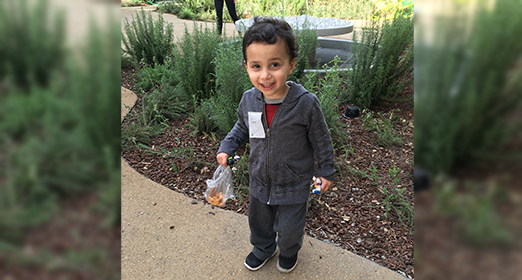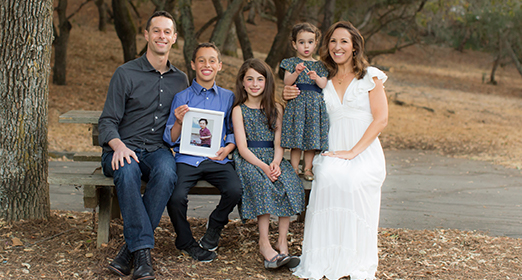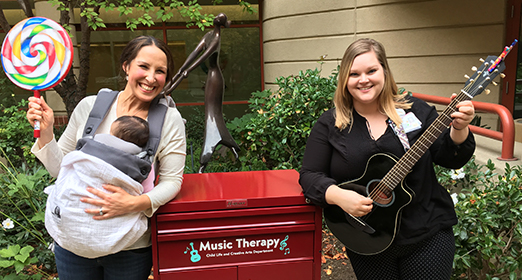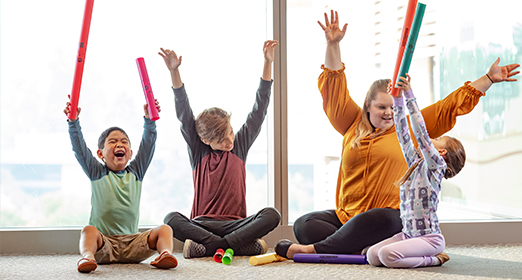From our first week with Andrew in the hospital in December 2014, we have dreamt of having a music therapy program that would bring moments of joy to the children and families dealing with the unthinkable at Lucile Packard Children's Hospital Stanford.
In 2014, we walked into the emergency room not knowing why our 14-month-old “Awesome Andrew”—the best third child ever—was pale and weak. A few hours later, we first heard the word “cancer,” and a few days after that, we heard his specific diagnosis: acute megakaryoblastic leukemia. For the next 100 days, Esther lived at the hospital with Andrew, spending most of that time in isolation while he received chemotherapy and a bone marrow transplant from his brother.
From the earliest moments, music soothed Andrew. Whether it was a song on the iPad during a blood draw or a dance with his mom during late-night nurses’ rounds, music filled Andrew’s room. And it filled his heart through those long days at the hospital as he battled the cancer; his magical months at preschool when he went into remission; the lows of hospice care after the cancer came back; and all the moments in between. We lost Andrew in late 2016 (shortly after his third birthday), but his music lives on and is louder than ever.
A few months after we lost Andrew, we made our first donation to the hospital with the support of more than 500 of “Andrew’s friends.” At the time, music therapy was a dream. Just three years later, there are three music therapists. To go from nothing to three full-time music therapists (and hopefully more!) in just three years is beyond what we ever imagined.
We return to the hospital often to see—and hear!—the progress. Last summer, we joined a music therapy group in the oncology unit where Andrew spent those 100 days. We were crying again . . . in amazement.
We sat in small school chairs. The kids in this group wore masks and had IVs coming out of their arms. Esther played the triangle. Dan beat a small drum. Rebekah, the music therapist, led the children in playing songs they learned and songs they wrote. The notes drifted across the unit, overpowering the beeping of machines and pagers.
Nurses and doctors stopped to join. One of Andrew’s former oncologists saw us, went back to his office to get his ukulele, and joined the session. He is learning to play the instrument in lessons from the music therapist with the kids. We were in awe.
The sad, dark, and dreary sitting room that we remembered was now the setting for a spirited group jam session. Nurses walked down the hallway and started dancing. The kids moved as best as their wires and energy levels allowed. A little girl who appeared to be 5 or 6 years old sang a song she wrote about what it is like to live at the hospital. Our bodies leaned forward to hear her small voice from behind her mask. Rebekah understood every word and encouraged her to finish the song, even though she was feeling quite shy. A few minutes later, the girl had to abruptly leave the room as her chemotherapy nausea crept back in.
This Is Not Just a Feel-Good Story.
While so much is done for kids’ bodies, it is also important to take care of their minds and their spirits. In one-on-one or group settings, music therapists help patients find ways to express their fears and anxieties and give children joy during their most difficult moments. Music therapy improves kids’ outlooks and moods while hospitalized. As parents who lived in the hospital, we know that when kids get to feel like kids, their bodies react better.
Doctors discover new insights about their patients from the music therapists because kids open up to the therapists about their physical and emotional feelings in conversations and in their song lyrics.
Music therapists support children on their way into procedures and help them through painful treatments. They give them a language to express their loneliness to their parents, who sometimes must leave their children to work. We have also heard that families are requesting music therapists to comfort a child who is near death.
On what would have been Andrew’s sixth birthday, and just two years after the music therapy program started, we announced that our family would be endowing the Andrew M. Levy Music Therapist position for oncology based on the new fifth floor of Packard Children’s. This guarantees that children with cancer will receive music therapy at the hospital in perpetuity (forever)!
Our family is committed financially, and spiritually, to doing whatever we can to ensure this program continues to thrive. It is so critically important that kids at our hospital are not just looked at as patients, but also as children who deserve moments of joy. They should be given opportunities to experience childhood—even from a sterile hospital room while attached to cords and receiving chemo.
Today, you can join us in spreading music therapy to children in our hospital by helping to expand the funding and programming for music therapy. We hope to grow the music therapy program to at least five music therapists in the years to come. The more music therapists we have, the more profound the impact music will have on the hospital experience for our patients and their families. Our goal is to fill every floor, from the ground floor entry to the new fifth floor oncology and stem cell units, with song.
And that’s what every child deserves—not just music from an iPad but from instruments and instructors, providing the chance to forget where they are for a few moments every day.
Thank you!
You can help spread music therapy to more children in our hospital. Visit supportLPCH.org/MusicTherapy.
This article originally appeared in the Fall 2019 issue of Packard Children’s News.



